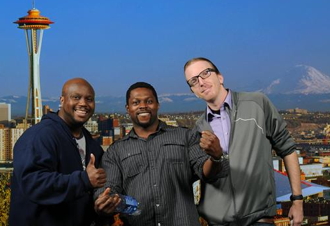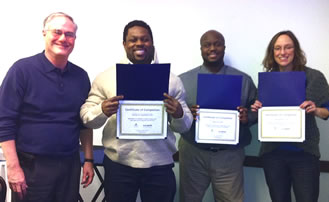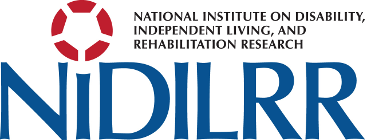Tech4POD News
Just Published Osteogenesis Imperfecta Book
Gerald F. Harris, Ph.D., P.E., Professor of Biomedical Engineering at Marquette University was one of the authors on a newly published Osteogenesis imperfecta book "Transitional Care in Osteogenesis Imperfecta: Advances in Biology, Technology and Clinical Practice." by Eds. Peter A. Smith, M.D., Frank Rauch, M.D. and Gerald Harris, Ph.D., P.E..
Tech4POD is proud to announce the Senior Design Tech4POD completion Winners for the 2014 academic year!
First place went to project B12: PROJECT DRESS UP. Members of the Senior Design Team for this project were Kaitlin Conti, Heidi Klancnik, Alia Mian, Natalie Profio, Cory Steinmetz, and Meghan Teich.
Second place went to project B10: Adaptive Gaming System. Members of the Senior Design Team for this project were John Blonien, Dan Bohlin, Matthew Klein, Avinash Kumar, Brittany McGuire, and Chantel Newman.
Third Place went to project B16: Poolshark 1000: Adaptive Pool Cue. Members of the Senior Design Team for this project were Eric Bremicker, John Coleman, Joseph Dung, and Jodi Fails, Benjamin Tretow..
Honorable Mention went to project B15: Adaptive Medication Dispenser. Members of the Senior Design Team for this project were Hugh Dales, Scott Gehring, Larry Kimmel, Alexis Krueger, and Carlos Marroquin.
Tech4POD congratulates all of our award winners!
Senior Design Tech4POD Completion Winners
Tech4POD attends State of the Science Symposium
The Rehabilitation Engineering Research Center (RERC) on Technologies for Children with Orthopaedic Disabilities (WWW.Tech4POD.org) held it’s State of the Science (SOS) Symposium on August 7th and 8th. The event was hosted by Shriners Hospital for Children in Chicago. Five sessions were conducted over a two day period with national experts from around the country. Session I on Thursday focused on rehabilitation robotics, virtual reality, and pervasive computing. Session II focused on home based rehabilitation and wearable technologies. The final session on Thursday focused on musculoskeletal assessment and modeling. Session I on Friday focused on imaging technologies. The final session of the State of the Science Symposium focused on clinical perspective and need. Attendees at the SOS symposium included physicians, therapists, engineers, researchers and parents of children with disabilities.
Marquette University Tech4POD attends fundraising event for United Cerebral Palsy of Southeastern Wisconsin
Researchers from Tech4POD attended United Cerebral Palsy (UCP) of Southeastern Wisconsin's 32nd annual fundraising event, "Taste of Milwaukee". Twenty-one restaurants presented their signature dishes to over 300 attendees, and all proceeds benefited UCP's program.
At the event, UCP of Southeastern Wisconsin also announced they will be changing their name to Broadscope Disability Services to better reflect the broad range of resources and support they provide to families and individuals living with disabilities including; respite care, employment services, independent living and the Charlie Kapp Resource Center.
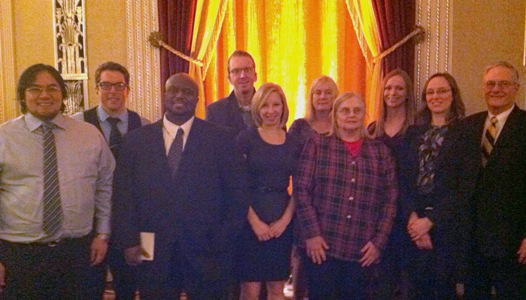
Pictured Left to Right: Ryan Inawat, Jeff Kertis, Salih Grice, MD, Ben McHenry, PhD, Tammy Cohen, Professor Susan Riedel, Deb Epps, Janelle Cross, Carolyne Albert, PhD, Gerald Harris, PhD.
Tech4POD researcher presents at Pacific Rim International Conference on Disability and Diversity
Tech4POD researcher and Marquette Biomedical Engineering Master's student, Ryan Inawat, presented "International Collaboration and Capacity Building in Southeastern Asia: Spreading Human Motion Analysis Techniques and Technology" at the Pacific Rim 2014 International Conference May 20, 2014. Recently, Ryan successfully defended his MS thesis, which investigated shoulder motion following rotator cuff repair surgery. Ryan will be attending medical school in August at the Medical College of Wisconsin.
![]() Ryan Inawat Poster Presentation (199.5 KB)
Ryan Inawat Poster Presentation (199.5 KB)

Pictured above: Ryan Inawat
Tech4POD attends the Pacific Rim International Conference on Disability and Diversity
Researchers from Tech4POD participated in the International Coference on Disability and Diversity held at the Honolulu Convention Center May 19-20, 2014. They were able to share with others the research progress, development, and training activities occuring at the rehabilitation engineering research center.
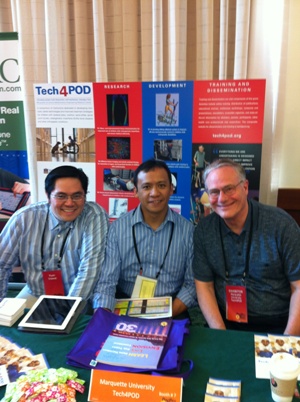
Left to Right: Ryan Inawat, MS, Karl Canseco, MD, Gerald Harris, PhD
AACPDM prepares for its 67th Annual Meeting in Milwaukee
AACPDM 67th Annual Meeting
October 16-19, 2013
Wisconsin Center
400 W. Wisconsin Ave, Milwaukee, WI 53203
Tech4POD will have significant exposure at the American Academy for Cerebral Palsy and Developmental Medicine (AACPDM) annual meeting (October 16-19 2013), which will be held in Milwaukee this year. The conference will highlight information about cerebral palsy and other childhood-onset disabilities in the basic sciences, prevention, diagnosis, treatment and advances in science. Tech4POD will present a pre-conference workshop, plenary, exhibit, posters, and hold their annual meeting. Dr. Harris, Tech4POD Director, will be delivering one of three "Guest Lectures" on Thursday, October 17. The 2013 AACPDM meeting theme is Research in Practice. Registration is still open.
United Cerebral Palsy of Southeastern Wisconsin hosts Joe's Run
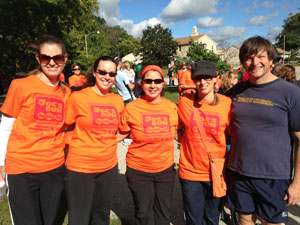
Joe's Run, Walk & Roll is a non-competitive 5k run, walk or wheelchair roll hosted by Cerebral Palsy of Southeastern Wisconsin (UCP-SEW). The event took place September 21 at Hart Park in Wauwatosa, WI. Tech4Pod supports UCP-SEW and its efforts to advance the independence and productivity for individuals with cerebral palsy and other disabilities.
Participants in Joe's Run for UCPSEW were: Kelly Strifling, Ph.D.,
Jessica Fritz, MS, Brooke Slavens, Ph.D., Carolyne Albert, Ph.D. and
Lars Olson, Ph.D.
Tech4Pod Presents an Online Lecture:
Home Based Technology for Children with Impaired Upper Extremity
Dr. Yi-Ning Wu presented a lecture on home-based technology therapy for children with impaired upper extremity. Electronics and video games are used as motivators for therapy. Children with hemiplegic cerebral palsy often neglect the impaired arm, which can lead to decreased brain excitability and hand mobility. Due to limited clinic visits in current rehabilitation practice, the program Massed-practice AT Home (MATH) was developed, incorporating electronics, video games and advanced software programming to create more effective outcomes in therapy.
Tech4POD Presents at GCMAS 2013
Alex Griffin of Tech4POD presented a paper titled "Fluoroscopic Assessment of Hindfoot Kinematics During Gait: Comparison of Barefoot and Shod Motion" at the 18th Annual Meeting of the Gait and Clinical Movement Analysis Society, on May 15th in Cincinnati, Ohio. An audio PowerPoint recording of his presentation is available for download on the Development D3 page.
Tech4POD Welcomes a New NIDRR ARRT Fellow
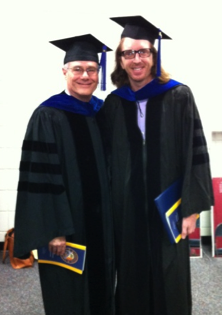
Dr. Gerald Harris (left) and Dr. Ben McHenry (right)
Welcome to our new NIDRR ARRT Fellow, Dr. Ben McHenry! Dr. McHenry is a recent graduate from the Biomedical Engineering Doctoral Program at Marquette University, Milwaukee Wisconsin. Dr. McHenry joined Miri Hwang, MD, PhD as a Pediatric Mobility ARRT Fellow in May, 2013. Ben’s background is in the field of biomechanical engineering and dynamic analysis. His dissertation is entitled, “Foot and Ankle Motion Analysis using Dynamic Fluoroscopic Imaging.” Ben’s dissertation Director was Dr. Gerald Harris.
See Training T1: AART Fellowships for more information about the ARRT fellowship.
Tech4POD Fellows Attend RESNA 2013 in Seattle
Tech4POD Postdoctoral Fellows Salih Grice (MD), Ime Udoekwere (PhD) and Ben McHenry (PhD) recently attended the Rehabilitation Engineering Research Society of North America (RESNA) conference in Seattle, Washington. Drs. Grice, Udoekwere and McHenry are all active reahabilitation researchers at the Orthopaedic and Rehabilitation Engineering Center (Marquette University / Medical College of Wisconsin) and contributors to Tech4POD.
Tech4POD Conducts Grant Writing Symposium at GCMAS
A Grant Writing Symposium was held May 17th, 2013 at the Gait and Clinical Motion Analysis Society (GCMAS) national meeting in Cincinnati Ohio. The four hour symposium was designed to help new and established investigators interested in submitting proposals to NIH. The Learning Objectives were:
- Learn the different funding mechanisms at NIH.
- Learn to interpret an NIH review.
- Learn to write the Specific Aims.
- Learn to develop a Research Strategy.
- Learn the process for submitting a Federal Grant.
- Appreciate the approaches to funding technology development/modeling grants.
Instructors for the Symposium and Workshop Panel were; Howard J. Hillstrom, PhD, Hospital for Special Surgery, Louis Quatrano, PhD, Eunice Kennedy Shriver National Institute of Child Health and Human Development (NICHD), National Institutes of Health (NIH), Kenton A. Kaufman, PhD, PE, Mayo Clinc, Gerald F. Harris, PhD, PE, Marquette University, Orthopaedic and Rehabilitation Engineering Center (OREC), and Jinsup Song, DPM, PhD, Temple University School of Podiatric Medicine.
Tech4POD Gait Training Graduates
The Motion Analysis Training Program in the Orthopaedic and Rehabilitation Engineering Center (OREC: Marquette University / Medical College of Wisconsin) has three recent graduates. These graduates are fully qualified to operate a Vicon, Nexus Motion Analysis Laboratory for clinical and research purposes. Training includes lower extremity motion analysis as well as specialized training in the segmental Milwaukee Foot Model (MFM). The course instructor was Ms. Jessica Fritz, MS who is a pre-doctoral candidate at Marquette University in the Biomedical Engineering Program.
Pictured from left to right are: Gerald Harris, PhD, PE (Director, OREC and Tech4POD), Ime Udoekwere, PhD, Salih Grice, MD and Carolyne Albert, PhD. Drs. Udoekwere, Grice and Albert are NIDRR Post-Doctoral Fellows.
Seminar: A Predictive Energy-Bounding Approach for Haptic Teleoperation
Presenter: Prof. Jeha Ryu
Department of Mechatronics/Medical Systems Engineering Gwangju Institute of Science and Technology
Gwangju, Korea (South)
In this seminar, a predictive energy-bounding approach (EBA) was presented for transparent and stable haptic bilateral teleoperation for any time delay and data losses as well as for any uncertain environments over any network. The proposed scheme (termed as Predictive EBA) combines the bilateral EBA with Smith predictor (SP) architecture in the master site which predicts the slave (site) states on the master site to improve the force tracking transparency using the SP while EBA guarantees robust stability against any uncertainties.
Quantitative and qualitative transparency analyses of bilateral EBA and Predictive EBA show significant improvement in magnitude and phase of feedback force and consequently the perceived impedance if the slave/environment dynamics is well known.
The proposed predictive EBA also allows any feedback signals such as measured contact forces/torques, position error based forces, and obstacle avoidance forces from slave sites. Experimental results show the effectiveness of the proposed predictive EBA for any large time delay while keeping robust stability of the overall system.
March is Cerebral Palsy Awareness Month!
Please spread the word and start educating your friends and neighbors about Cerebral Palsy. You can show support by wearing green or a green ribbon.
For more information visit: United Cerebral Palsy
Tech4POD Presents an Online Lecture:
Title: Home-based technology for children with impaired upper extremity
Speaker: Dr. Yi-Ning (Winnie) Wu
Host: Li-Qun Zhang
1-2pm CST on February 15, 2013
Abstract: Cerebral palsy (CP) is one of leading causes of childhood disability. Children with CP have impaired motor or sensory function or both about one limb, one side of body or four limbs depending upon the lesion site and size of the brain. Children with one side of body involved are categorized as hemiplegic CP. A child with hemiplegic CP often only uses the unimpaired arm for daily activities and disregard his/her less-able arm, which is potentially valuable. This observed developmental disregard is similar to the learned non-used seen in the adult stroke. Decreasing usage of impaired hand leads to further reduction in excitability of injured brain. This connection sets off a deleterious circle of decreasing brain excitability and hand mobility. Massed-practice of the impaired hand is thought to facilitate use-dependent neuroplasticity and promote functional recovery of hand use. However, solely relying on the conventional rehabilitation is not practical to reach the effective intensity of massed-practice because of limited clinic visits due to health care cost, time commitment, travel inconvenience, etc. To overcome the limitation, we have been developing a low-cost home-based therapy system which could deliver and monitor Massed-practice AT Home (MATH) beyond the clinical setting. Our system, consisting of a standard computer, a small hand-held controller, an arm rest, a camera and various video games, capitalizes on cheaper electronics, advanced software programming and using video games as motivators. In this talk, I will share the findings and experience based on our earlier home-based approach and the currently evolved approach. I will also present the preliminary data on how the children responded to our new system. Our system can potentially have great impact on the neurorehabilitation for both children and adults with movement disorders.
For more information, please contact Dr. Li-Qun Zhang.


